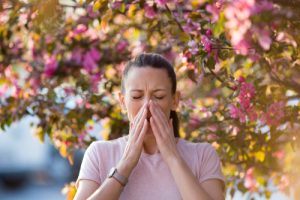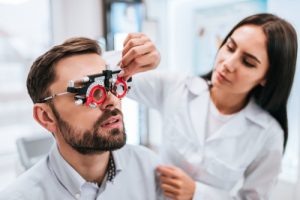Spring has sprung, and with it comes plenty of pollen and allergy symptoms if you suffer from seasonal allergies. Allergy season is here, and if your eyes are feeling drier than usual, you may have allergies to thank for increased feelings of discomfort.
Struggling with allergy symptoms can be frustrating, but your frustration can build even more when you contend with dry eyes. The combination can leave your eyes feeling itchy, burning, and irritated. Don’t let dry eyes ruin your life and worsen your allergies.
There are ways to ease both symptoms by addressing the root cause of your dry eyes and taking steps toward treating them. Keep reading to find out what you can do to tackle your dry eyes this allergy season and get the relief you so desperately need!
Allergies and Dry Eye

Allergic conjunctivitis, or the symptoms that cause your allergies, can be very similar to the signs of having dry eyes. Both cause inflammation and can make the eyes runny and generally irritated.
But there are differences between the symptoms of each condition. When you have allergies, one of the primary symptoms you may experience is your eyes feeling itchy. On the other hand, dry eyes often feel like they’re burning and gritty.
If you experience both symptoms, you’re likely suffering from both dry eyes and allergy symptoms. This combination can be very uncomfortable while also putting your long-term eye health at risk.
Having dry eyes and dry eye syndrome, in particular, can put you at higher risk for infection and corneal ulcers. When you also add in having eyes that feel itchy and more inflamed due to allergies, that risk increases even more.
Eventually, you end up in a vicious cycle. The more your eyes itch and feel uncomfortable, the harder it is to resist rubbing at them and the more irritated they’ll become. Although rubbing your eyes may feel good when you do it, succumbing to the pressure can cause long-lasting damage to your eyes.
Treating allergy symptoms by taking allergy medication is a good idea, but it still doesn’t address the primary concern of dry eyes. You’ll need to see your eye doctor for evaluation and treatment.
What Can Cause Dry Eye?
On a basic level, the cause of allergies is allergens. Most people’s allergies are due to being allergic to pollen, one of the most common allergens.

When there’s more pollen in the air, more people end up with allergic conjunctivitis. What’s not as straightforward is trying to find out the cause of why someone’s eyes are dry.
A variety of things can trigger dry eyes. The critical reason why people have dry eyes is tear production.
Your eyes don’t produce enough tears, or, more commonly, your eyes don’t create the right balance of oil, water, and mucus needed for healthy tears. Your tears have three layers of oil, water, and mucus.
Dry Eye Syndrome
If any of these crucial components are missing in the tear film, or you’re not creating the right amount, it can affect the composition of your tears and how healthy they are. When tears don’t have the right mixture, it may lead to the development of dry eye syndrome.
Dry eye syndrome is a chronic condition that may develop for several reasons, including certain medical conditions, hormonal changes, and getting older. You’re also more likely to develop dry eye syndrome if you’re older or a woman.
Besides tear composition, dry eyes can be temporary and triggered by environmental conditions like dry weather or irritation from contact lenses. Contact lenses also exacerbate allergy symptoms, so it’s essential to consider them when addressing the root cause of your eye irritation.
You should see an eye doctor for diagnosis and treatment no matter what kind of dry eyes you have. Most eye doctors will recommend non-invasive treatments as a starting point before resorting to prescription medication or surgery.
Home Remedies for Treating Dry Eyes
If your dry eyes are bothering you, your eye doctor may recommend some home remedies for improving them. These may include using over-the-counter artificial tears, proper nutrition and hydration, and a warm, wet compress over the eyes.
If your dry eyes are due to your environment or contact lenses, your eye doctor may suggest taking a break from contact lenses, making small lifestyle changes, or using a dehumidifier at home or your place of work.
Nutrition and Omega-3 Fatty Acids

Nutrition plays a significant role in keeping your eyes healthy. One type of nutrient, in particular, is vital for healthy tear production.
That nutrient is omega-3 fatty acids. You can find omega-3 fatty acids in supplements like fish oil or flaxseed oil, although it’s better to absorb vital nutrients directly from food instead of supplements.
You can find them in fatty fish like tuna, salmon, cod, herring, walnuts, and different kinds of seeds. Doing your best to incorporate more of these foods into your diet can make a big difference and help your tear health.
Local Honey for Allergies
Another way to improve your allergy symptoms through nutrition is by consuming local honey. Honey contains small amounts of pollen and allergen that cause your allergic reaction.
By ingesting honey harvested in your local environment, you can slowly adjust to more of the allergens that your body is already flagging as allergens. Keep taking any allergy medications, including prescription and over-the-counter, to get the full benefits during allergy season.
If these lifestyle changes and non-invasive treatments don’t alleviate your dry eye symptoms, it may be time to talk to your eye doctor about treating your symptoms with medication or other options.
Professional Dry Eye Treatment
There are a few kinds of medications, therapies, and non-invasive procedures that can help treat more severe cases of dry eye syndrome. Talk to your eye doctor about these treatments to find which one is right for you.
At Williamson Eye Center, our team will start by taking an in-depth ocular history. You’ll also complete our SPEED survey, which will help us understand your current dry eye status and symptoms.
We will then perform a Tear Lab test to analyze how many tears you produce and their quality. Knowing this information will help us determine the best dry eye treatment for you.
After performing Tear Lab and receiving your personalized Tear Lab number, we’ll have you undergo another test called Inflammadry. Inflammadry is an in-office test that helps detect if you have elevated levels of MMP-9.

MMP-9 is an inflammatory marker that will be consistently higher in the tears of patients who have dry eye disease. After analyzing the test results, we’ll determine the personalized treatment regimen that best treats your dry eyes.
The important thing is that you seek treatment from your ophthalmologist if you struggle with dry eye. There’s no better time to do so than now, with allergy season gearing up and pollen floating through the air.
Get the relief you need to get through allergy season and the rest of your life. Dry eyes are common and very treatable, but you need to be willing to take that first step towards diagnosis before getting the treatment you deserve.
Learn more about dry eyes and the best way to treat your dry eyes by scheduling an appointment at Williamson Eye Center at one of our convenient locations in Baton Rouge, Denham Springs, Gonzales, New Roads, or Zachary, LA, today!



